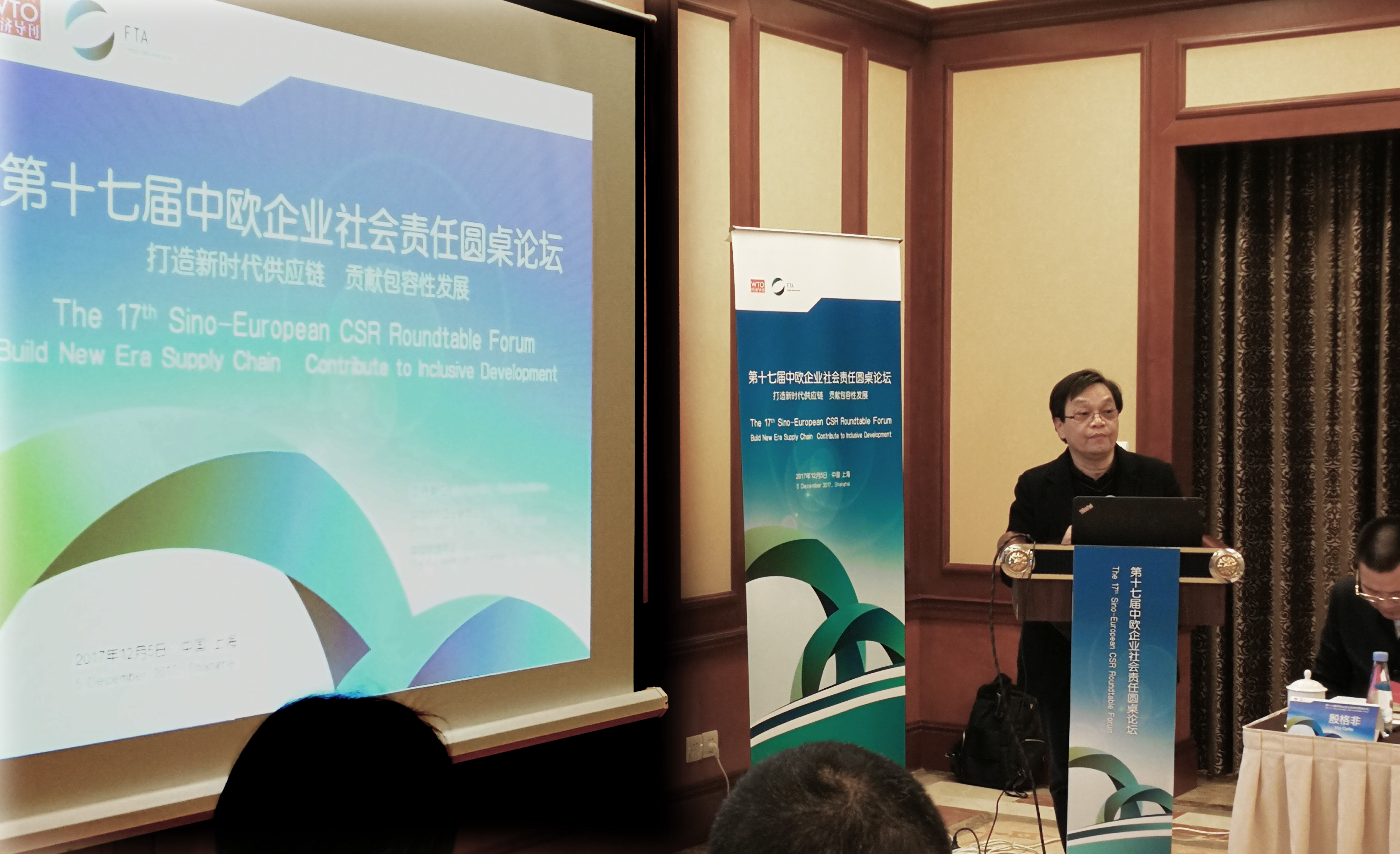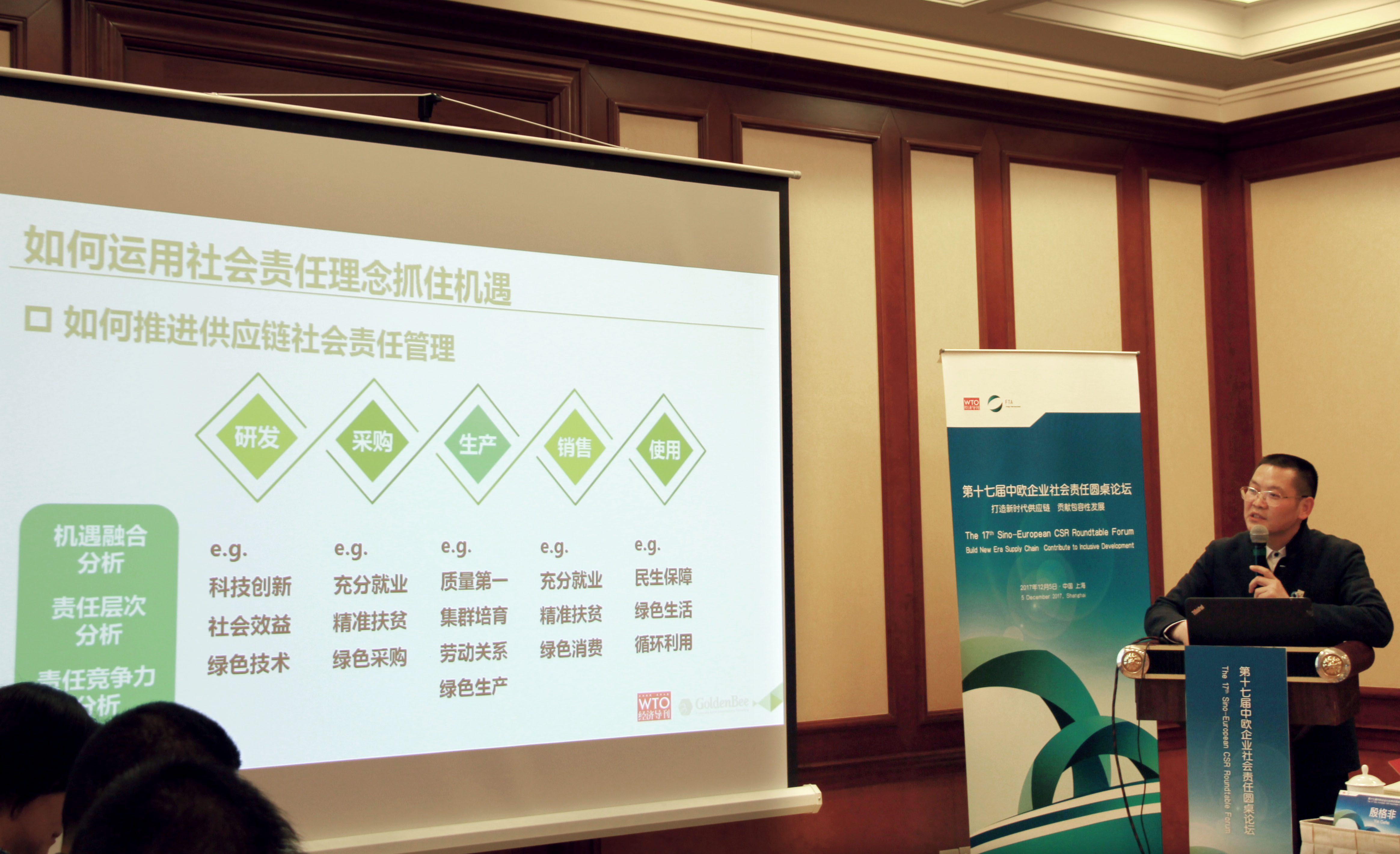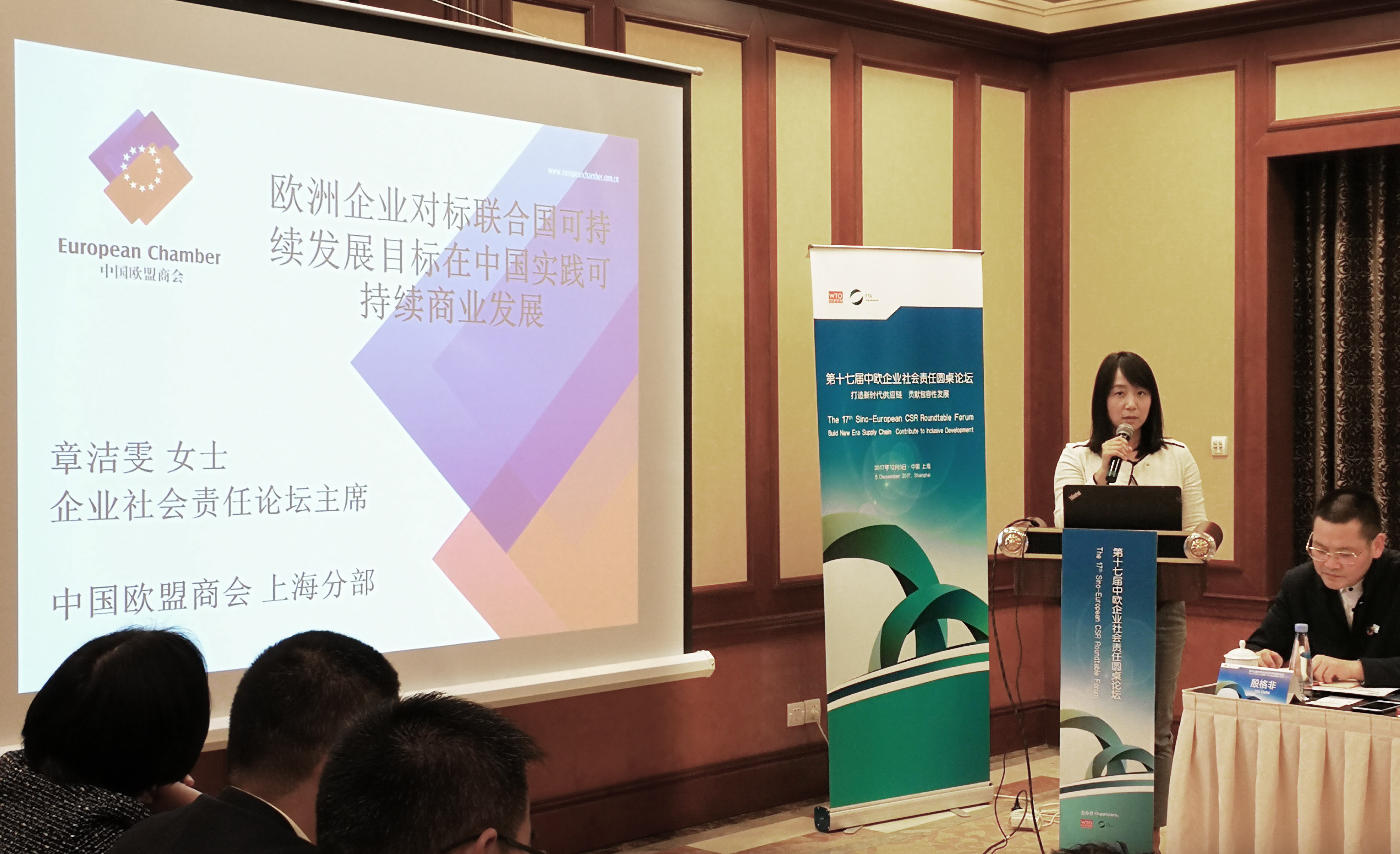Gather the power of enterprises in the new era to contribute to the inclusive development
2017-12-26GoldenBeeadmin0010

Focusing on “Build New Era Supply Chain, Contribute to Inclusive Development”, this roundtable responded to the transformation of the principal contradictions in China proposed from the 19th CPC National Congress and the UN Sustainable Development Goals. This event brought together a large number of attendees – featuring sustainability experts, representatives from the Chinese government, CSR organizations, NGOs, business associations and academia – discussed the issues like, how to build a responsible supply chain to promote sustained, inclusive and sustainable economic growth, and how to change the “unbalanced and inadequate development” of the enterprises themselves and their industries to better meet the people’s ever-growing needs for a better life” in the new era, and contribute their ideas.
Mr. Zhang Yanming, Standing Deputy Director, Corporate Social Responsibility Office of Shanghai Pudong New Area introduced Shanghai Master Plan for 2016-2040 in his welcoming address and emphasized the role of government in promoting “decent work and economic development”.

He also shared the new measures of government in Pudong New Area on how to promote CSR in recent years. He pointed out that since the implementation of Chinese national standard for social responsibility last year, Pudong New Area has adjusted and upgraded its existing CSR assessment standards. By adding clauses and indicators in “helping value chain partners improve social responsibility practices” and “implementing and participating in local skills development plans”,etc., to drive enterprises pay more attention to inclusive development and adequate development in procurement, sales and other links of value chain operation process and further improve local employment environment, support vocational skills training and technical development.
“The driving and radiation ability of enterprises can also promote the development balance among regions and balance among enterprises. At the same time, special attention has also been paid to the non-standard employment during the rapid economic development and the protection of sharers’ rights and interests in the sharing economy”, Mr. Zhang added that, “enterprises are also encouraged to treat different types of workers with a responsible attitude and ensure their decent work and career development.
FTA is committed to promoting the sustainable trade over the past 40 years. Ms. Joyce Chau, Foreign Trade Association (FTA) Representative Greater China introduced that, FTA has developed a strategy called Vision 2030 in June 2017 and this vision clearly reflects the belief in a world where all trade delivers social, environmental and economic benefits for everyone. Practicing“trade with purpose”,FTA is missioned to enable business to enhance human prosperity, use natural resources responsibly and drive open trade globally.

“Specially, Chinese President Xi Jinping elevated the implementation of SDGs to a new level, the vision of ‘the Community of Common Destiny of Mankind’ at the 19th CPC National Congress and Made in China 2025 also advocates innovative green manufacturing, which will help create a sustainable and inclusive supply chain in a new era”, Ms. Chau said that, “FTA has more than 100,000 first-tier and second-tier partners in the world, of which more than 30,000 are from Greater China. FTA will work with our members to promote the responsible supply chain and practice sustainable trade.”
Yin Gefei, Chief Advisor of China WTO Tribune, elaborated the new judgments and key points concluded from the19th CPC National Congress and the possible challenges and opportunities in economic development, social harmony and ecological progress in his speech. He also pointed out the direction of practice and change for enterprises by citing the theory of “Three Hierarchies of Responsibility”.

Mr Yin suggested that enterprises should regard enhancing responsible competitiveness as a measure and methodology for solving the “unbalanced and inadequate development” problems. While enterprises solve the problems, they also fulfill their social responsibility. This process can increase product and service opportunities for enterprises. It not only improves competitiveness and reputation, reduces costs, but also enhances responsible competitiveness and sustainability capability. For the “unbalanced and inadequate development” problems in supply chain, enterprises need to try to find out the relations from research and development, procurement, production, sales and product use and other aspects, and analyze their responsibilities to find out the gaps and promote the inclusive development.
Ms. Cindy Zhang, Chair of CSR Forum of EU Chamber of Commerce’ Shanghai Chapter, introduced the work of CSR Forum of European Chamber in China, and shared its vision. She said that, in the past decade, the CSR Forum has been actively cooperating with relevant think tanks to help European companies better operate in China and promote senior management to rethink SDGs so that more business leaders can strengthen their awareness of responsibility to economy , society and environment, changing them from CEO to social entrepreneurs.

In the future, the CSR Forum will further promote the companies to benchmark with SDGs, hoping to mobilize internal and external resources and encourage partnership and leadership development, by which to deepen the implementation of the Sino-European sustainable development goals in China and enable enterprises in the Chinese market and the EU market to assume the same responsibility. During this process, members of the European Chamber will play an exemplary role in the development of small and micro-enterprises and private-owned enterprises.
From a global retailer’s perspective, Mr. Crete Zhou, Head of Corporate Affairs, METRO China, interpreted how to build a sustainable supply chain in the new era and shared METRO China’s practice in this aspect with vivid cases and reliable data.
“As a bridge linking farmers, producers, suppliers and customers, METRO continuously improves its supply chain and minimizes carbon emissions in its process. Starting with the responsible purchasing, METRO practices green operations and low-carbon transport and aims to be a good employer by practicing the idea of “in business together”, regarding sustainability as a core competitiveness.” Mr. Zhou also introduced the background of the first food bank project in China by METRO and its operating mechanism. Through the extension of the value chain, the project successfully reduced food waste in circulation, cared for vulnerable groups in society and promoted the social inclusiveness.
Mr. Tang Ye, Senior Manager of Supplier Management Department, China Eastern Airlines, themed with “A Tool for Inclusive Development” in his speech,shared China Eastern Airlines’ innovation in the supply chain management. By including specific requirement for fulfilling social responsibility in process of supplier sourcing, supplier auditing and supplier performance evaluation, the company enhances the suppliers’ evaluation of their impact on society and environment.

Mr. Tang explained that, in the supplier auditing, besides some general categories and the market supplies with full supply, China Eastern Airlines is using a comprehensive scoring method and transfers the specific requirements of fulfilling social responsibility into indicators in business ratings to conduct supplier evaluation. Three indicators are mainly set, namely whether it is identified as poverty alleviation project by the government; whether it promotes local employment and economic development; whether the business itself and the manufacturing process is environmentally friendly, so as to promote the sustainable behaviors of suppliers. He also illustrated the synergies and cooperation, mutual trust and development between enterprises and suppliers, and their contribution to inclusive economic development by sharing the responsible purchasing of on-board water.
In the roundtable discussion, all participating guests discussed the main “unbalanced and inadequate development” problems in the supply chain, related difficulty and challenge for the enterprises and shared some mature mechanisms and practices. They also proposed some approaches and suggestions from their own perspectives.
Mr. Yin reported on discussion results and recommendations and gave the closing remarks.
Firstly, the “unbalanced and inadequate development” problems exist at different levels, including imbalance and inadequacy between the dialogue of suppliers and purchasers, imbalance between purchasers in terms of implementation, the imbalanced efforts and achievements between purchasers, the imbalance and inadequacy in capacity-building, and the development imbalance of enterprises brought by the imbalance in regional development.
Secondly, from the perspective of solutions, the role of government is the most important. The government is not only a facilitator of simple industrial transfer, but also is hoped to seek a balanced industrial development and a win-win situation among regions. In addition, the training and supervision by the government can also be conducive to the improvement of suppliers.
Thirdly, in terms of standard integration, it is a common demand within the industry to form a number of Chinese standards with international compatibility and to establish a database to gather the suppliers’ social responsibility information. This will further increase the voice and power of suppliers, and enhance their enthusiasm and discourse.
Fourthly, suppliers need to enhance their awareness and understanding of the lasting benefits of sustainable management improvement and achievements, and create a transmission mechanism to facilitate the delivery of results and actions.
Fifthly, the auditing, certification and objective, true and neutral reports are very important. Certification bodies and audit agencies should facilitate the utilization of information adoption with responsible attitude and professional capability for buyers.
Sixthly, play the role of e-commerce platform in commercial control and conduction to promote the improvement of suppliers while safeguarding consumers' rights and interests.
Best Practices
- The 100-year brand — Air Liquide also has a sense of juvenile
- Beijing Public Transportation Corporation: Developing green transportation to build a harmonious and livable capital
- CGN: Building a modern factory in barren deserts and developing a new win-win cooperation model along “Belt and Road”
Upcoming Event

All the materials on the site “Source: XXX (not from this site)” have been reprinted from other media. They do not imply the agreement by the site.
All the materials with “Source: CSR-China Website” are the copyright of CSR-China Website. None of them may be used in any form or by any means without permission from CSR-China Website.
GoldenBee Official WeChat
Copyright © Csr-china.net All Right Reserved.
京ICP备19010813号










